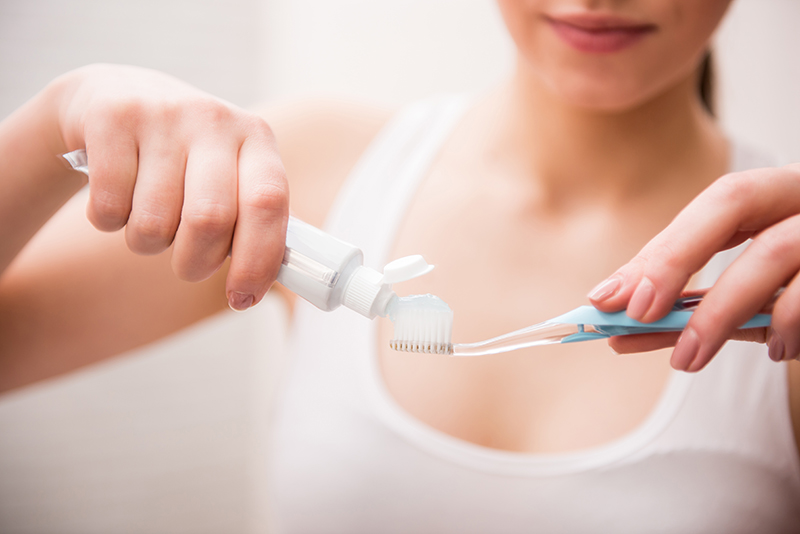Oral mucous membranes are quite fragile, where "oral mucositis" usually happens due to chemotherapy or radiotherapy for head and neck cancers, 7 to 14 days after treatment, with symptoms including dry mouth, redness, swelling, ulcer, pain, taste changes, difficulty in swallowing or eating, loss of appetite and difficulty in speaking.
When white blood cell count starts to rise to normal range, the symptoms of oral mucositis will gradually slow down. However, the lack of good oral care will affect the healing of the mucous membrane, resulting in delayed treatment, and in serious cases, infection or death. It is therefore important that you continue to perform proper oral care every day when you begin receiving treatment. When the oral mucosa is intact and there is no discomfort, correct oral care techniques should be established:
- Brushing teeth: Performing correct oral cleaning regularly and continuously
Brush your teeth at least four times a day, 30 minutes after meals and before bed, to reduce the irritation of scraps of food to oral mucosae and teeth.
Brush your teeth in front of a mirror, carefully remove the food scraps on the surface of the teeth and the gap between the teeth; brush the upper teeth from top to bottom, and brush the lower teeth from bottom to top. Brush every tooth, crevices, gums and missing surfaces, with 3 to 4 teeth at a time.
The gums can be massaged with a soft-bristle toothbrush or a clean finger. Dental floss must be used more than once a day to remove plaque. If bleeding occurs, the use of floss should be suspended.
Patients with dentures should remove the dentures and clean them after meals.
- With the help of a mirror and a flashlight, examine and record the changes of oral mucosae every morning and evening when brushing your teeth, including whether the lip, tongue, cheek and gingival mucosae are complete, pink and moist, there is no pain, burning sensation, swallowing and taste sensation are normal, saliva is clear as water.
- Choosing appropriate oral cleaning products
A soft bristle toothbrush is recommended. Before use, soften the toothbrush with warm water to reduce mucosal irritation. Choose toothpaste that contains fluorine to reduce the occurrence of tooth decay. Most of the mouthwashes advertised contain alcohol, which can stimulate and dry the mucosa. Do not use them. Use the mouthwash prescribed by your doctor.
- Gargling
Gargle with 20 to 30 c.c. of mouthwash every 2 to 4 hours, 30 minutes after eating, or if your mouth feels dry. During nighttime sleep, try to gargle once to keep your mouth moist.
Use antifungal mouthwash (light yellow Nystatin suspension) that can be swallowed as directed, or mouthwash that cannot be swallowed (green Parmatson). Avoid eating and drinking water within 30 minutes after use
Drink at least 3,000 cc of water per day when without specific limits from your doctor.
- Correct dietary intake
Avoid consuming foods that irritate and damage the oral mucosa, such as tobacco, alcohol, betel nut, foods that are hard and rough, spices that are excessive, sour and salty, foods that are spicy or hot. Maintain a pleasant mood and environment during meals. Eat several small meals a day and chew slowly, with an increase in the amount of food to avoid abdominal distension.

When the oral mucosa has ulcers, feels pain, burning or uncomfortable when eating, oral cleaning should be strengthened and emphasized, with key points listed as follows:
- Maintain oral cleansing activities described above. When you are awake, perform oral care every two hours. Use a sponge toothbrush moistened with mouthwash to gently clean ulcers.
- Continue to use the mouthwash prescribed by the doctor. Use the mouthwash after it is chilled in the refrigerator to relieve pain and discomfort.
- Dental floss is forbidden to pick your teeth. Patients with active dentures use dentures only when eating.
- Eating by mouth can help saliva secretion and oral joint movement. Consume food that is soft, good quality, easy to swallow and digest, especially those containing protein, vitamin B and C, such as steamed eggs, tofu, pudding, milkshakes, jelly, tender vegetable leaves, melons and fruits. Foods that are broken down by a blender are also recommended.
- Cold food can reduce the pain and irritation to the mucous membrane and is easier to swallow.
- Chew sugar-free gum to boost saliva production or hold ice cubes in your mouth to reduce dry mouth.
Conclusion
Damage to the oral mucosa can cause pain, inability to eat, poor nutrition intake and poor communication. When you begin to receive chemotherapy or head and neck radiotherapy, oral mucosal lesions occur at the same time. Therefore, having the correct concept of health care and correct care practices can effectively maintain the optimal state of your oral mucosa.

